FAQ
TL;DR: A rewound microwave transformer can deliver 2–3 kA at 3 V, giving clean welds on ≤ 1 mm steel; "thin sheets can be welded" [Elektroda, SP8JUX, post #8983435] Build uses 2–3 turns of 21 mm² copper for the secondary [Elektroda, megabit, post #8870237]
Why it matters: Anyone with basic tools can repurpose an old microwave into a safe, low-cost spot welder for hobby metalwork.
Quick Facts
• Microwave oven transformer power: 750 – 1000 VA typical [Elektroda, ElectroTom, post #8873656]
• Recommended core cross-section: > 20 cm² for useful welds [Elektroda, karol3, post #8875443]
• Secondary voltage target: 3 – 4 V at 2 – 3 kA [Elektroda, wzk, post #8871920]
• Copper current density limit: ≤ 10 A/mm² for short duty [Elektroda, karol3, post #8943615]
• Triac failure edge-case: 800 V devices punctured without proper snubbers [Elektroda, kuraś, post #17957830]
1. What transformer should I use for a DIY spot welder?
Choose a microwave oven transformer (MOT) with a core cross-section above 20 cm² and power around 800 VA; smaller units give weak welds [Elektroda, karol3, post #8875443][Elektroda, ElectroTom, post #8873656] Remove the high-voltage secondary and shunts before rewinding.
2. How many turns are needed on the secondary winding?
Wind 2–3 tight turns of 4 AWG (≈ 21 mm²) copper to obtain 3 – 4 V open-circuit; this yields 2–3 kA short-circuit current [Elektroda, megabit, post #8870237] Keep bends smooth to avoid insulation cuts.
3. How do I calculate the primary turns if I build from scratch?
Determine turns-per-volt (TPV) from TPV ≈ 45 / Acore(cm²) at 50 Hz [Trafo Design Guide]. Multiply TPV by mains voltage (e.g., 230 V) to get primary turns. Example: 20 cm² core → TPV ≈ 2.25; primary ≈ 520 turns.
4. What welding current and time join 1 mm low-carbon steel?
Press with ~1 kN, pass 3 kA for 0.4 s [Elektroda, wzk, post #8871920] Higher current with shorter pulses improves nugget quality.
5. Which materials work for home-made electrodes?
Use CuCr1Zr or CuCo2Be copper alloys sold as MIG contact tips; they resist softening and conduct heat well [Elektroda, yetihehe, post #8872907][Elektroda, kemot1991, post #19972983] Mild-copper rods erode fast.
6. Can a MOT welder join 0.2 mm battery tabs?
Yes—fit twin side-by-side electrodes, cut pulse to 5–20 ms, and limit current to ~1 kA for nickel-plated cells [Elektroda, Freddy, post #8985381] Practice on scrap first to avoid cell vent damage.
7. How do I activate the weld safely?
- Clamp sheets with the electrodes.
- Trigger the primary via foot switch or timer.
- Release after the set pulse.
This prevents arcing on approach and yields repeatable heat [Elektroda, karol1010, post #8870462]
8. Is water cooling necessary for electrodes?
Commercial machines pump coolant through electrodes [Elektroda, Snikers, post #8870592] For hobby duty (≤5 s on, 30 s off) air cooling suffices; add a fan if tips exceed 150 °C [AWS, 2020].
9. How strong are DIY spot welds?
A good weld tears the surrounding sheet during peel tests; poor welds shear at ≤50 % parent metal strength. Excess heat or low pressure create weak "button" joints [Elektroda, audiofil, post #8889775]
10. Why did my triac or relay burn out?
High inrush plus transformer leakage causes >1 kV spikes. Triacs rated 800 V without RC snubber puncture [Elektroda, kuraś, post #17957830] Use 1200 V devices, RC snubber (100 Ω/0.1 µF) or zero-cross SSRs.
11. Can I parallel two identical MOTs for extra power?
Yes, but phase them correctly and wire the secondaries in parallel. Add independent fuses; mismatch raises circulating currents that overheat cores [EWI Tech Note].
12. Does leaving the microwave’s magnetic shunt hurt output?
Yes. Shunts limit current and drop 10–15 % power; remove them for full kA capability [Elektroda, hobbyelektronik, post #8981120]
13. How thick should the secondary conductor be?
Keep current density ≤10 A/mm² for short pulses [Elektroda, karol3, post #8943615] For 3 kA you need about 300 mm²—achievable with stacked copper strips or multiple parallel cables.
14. Can I weld a sheet to a box section if electrodes are not opposite each other?
Offset electrodes increase resistance path and may burn holes. Place tips directly across or use projection welds for profiles [Elektroda, Galareta, post #8880118]
15. Where can I buy electrode holders (copper lugs) in Poland?
Search for “oczka miedziane zaciskowe” or “miedziane końcówki kablowe”; electrical wholesalers and online stores list sizes up to 120 mm² [Elektroda, jagp, post #18955635]
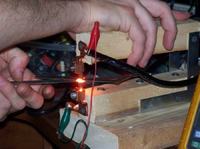
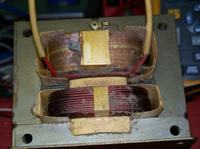
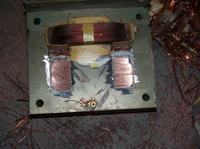
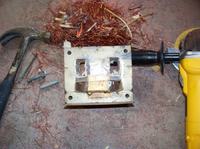
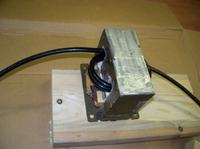
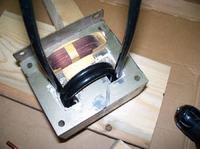
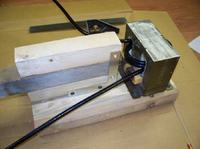
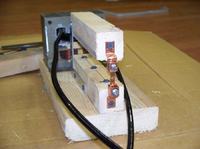
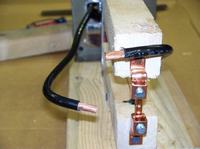
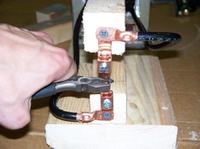



Comments
Brilliant in its simplicity. What are the electrodes made of? I would add a spring that would not allow the electrodes to be short-circuited accidentally, and a switch that turns the device on only when... [Read more]
I think that the switch is only for the foot because it is better if the current starts flowing only after the electrodes are firmly pressed. Interesting construction. [Read more]
Coolant is pumped through the electrodes in commercial equipment. [Read more]
Could someone write how many turns are needed on the primary? [Read more]
It all depends on how big your core is. Calculate the number of turns per volt by the formula. Patterns are easily available on the Internet. [Read more]
As for the transformer, it makes more sense to ask what the minimum power must have to weld metal sheets with a thickness of, for example, 1mm. [Read more]
:arrow: microscope ? of the electrode working part = 5 mm, pressing force = 1kN, welding current = 3 kA, welding current flow time = 0.4 s. Successful attempts! [Read more]
Very interesting and brilliant in its simplicity design. in my free time, do something similar because I have to mount a hinge to a metal cabinet :) are the electrodes maybe from some plug ?? How much... [Read more]
In this machine, the electrodes are from MIG. [Read more]
The same solution (trafo) is used in a transformer soldering iron. I wonder if such a luck can be adapted for this purpose. [Read more]
In the soldering iron, the transformer has a power of approx. 100VA. The one from the microwave, I think, about 800VA. I also wonder what the smallest transformer power would be enough to make a welding... [Read more]
What is the strength of such a connection, what loads can it withstand? [Read more]
I have a similar device, but from a Rubin transformer (yes TV from behind the eastern border) 300W. It even works well, but the welding takes about 4 seconds, which is quite a long time ... so 300W is... [Read more]
The primary winding of this transformer is probably not connected to 230V? [Read more]
Rather, it is definitely 230V. Why should it be any different? [Read more]
I don't want to look for scripts, but the entire production of cars is based on spot welds. Of course, we are talking about the production of the car body. [Read more]
The photos of the transformer show a rather thick flat bar on the primary winding :?: [Read more]
The visible winding is made of round wire. If you are serious about such a welder, the transformer used must have a central column cross-section above 15cm?. Below this cross-section, at most a toy will... [Read more]
Aa, that is, such a transformer from a welding machine will be suitable? :) [Read more]